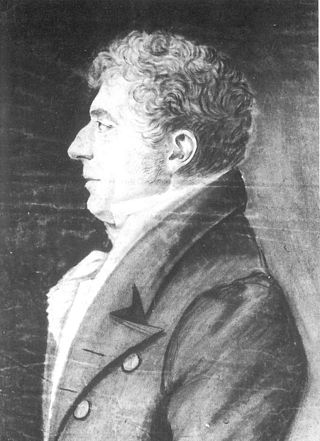Top Qs
Timeline
Chat
Perspective
Christian Adolph Overbeck
German poet From Wikipedia, the free encyclopedia
Remove ads
Christian Adolph Overbeck (21 August 1755 in Lübeck – 9 March 1821 in Lübeck) was a German poet, and the Burgomaster of Lübeck.

Life
Summarize
Perspective
Family
Overbeck was the son of the lawyer, Georg Christian Overbeck (1713–1786) and his wife Eleonora Maria Jauch (1732–1797), and also grandson of the superintendent Caspar Nikolaus Overbeck (1670–1752). He was the nephew of the rector of the Katharineum, Johann Daniel Overbeck (1715-1802). The painter, Friedrich Overbeck (1789–1869), and the jurist, Christian Gerhard Overbeck (1784–1846) were his sons. His grandson was the archeologist Johannes Adolph Overbeck (1826–1895). In 1781 Overbeck married Elisabeth Lang (1753–1820), whose family was originally from Nürtingen and shared ancestors with Friedrich Hölderlin and Ludwig Uhland.[1]
Education
He studied at the Katharineum of Lübeck, of which the rector was his uncle Johann Daniel Overbeck (1715–1802), and then from 1773 to 1776 studied law at the University of Göttingen, meanwhile attending lectures on philosophical, mathematical, scientific and historical subjects. Overbeck had many friends in the Göttinger Hainbund, but was never a member. In 1788 he acquired his doctorate and from then on prefixed his name with "Dr.iur.utr."
Professional career

Overbeck's career began with a failed attempt in 1776 to found a school, the Erziehungsanstalt für Knaben, in Bremen, after the example of Joachim Heinrich Campes. In the same year he began his legal career as a barrister in Lübeck, and in 1779 he was appointed Supreme Court procurator. In 1792 he became assistant general counsel of the cathedral chapter of Lübeck. In 1800 this was followed by his appointment to the Senate of Lübeck. In 1804 he was a representative of Lübeck in St Petersburg, and in 1808-9, 1810 and 1811 a representative of Lübeck in Paris, when he attended the wedding of Napoleon I of France with Marie-Louise of Austria. During Lübeck's occupation by France he filled the office of Receveur de la caisse communale. In 1814 he finally became Burgomaster of Lübeck.
Other responsibilities
On 16 October 1776 Overbeck joined the Freemasons' lodge Zum goldenen Zirkel in Göttingen and on 31 March 1777 became a member of the Lübeck lodge Zum Füllhorn, where from 1791 to 1797 he served as chairman five times. In 1779 he became Mitstifter at another Lübeck lodge, Zur Weltkugel. He was an Illuminatus under the name Anacreon.[2] In 1789 he helped to establish the Gesellschaft zur Beförderung gemeinnütziger Tätigkeit, and in 1791 and 1794–1797 he was its director. He was also a praeses for the Bible Society.
Remove ads
Significance
Overbeck utilised his diplomatic skills during the French occupation of Lübeck, and his skills as a jurist during the reorganisation of the city's constitution and finances after the years of war. He distinguished himself by his enlightened attitude to reform in the areas of school, church and poor relief. In addition, he showed artistic talent as a composer and songwriter. He had a gift for languages, demonstrated in translations of Greek and Latin odes, French drama and English travel literature.
Remove ads
Quotations
- "This great Hanseat, who during the French occupation of Lübeck defended its interests so ably in Paris and thus contributed so much to the wellbeing and prosperity of his native city, is a shining example of the kind of responsible model citizen in the latter half of the 18th century to which the Hanseatic myth owes so much."[3]
- "The model of a gentleman."[4]
Notes
Works
Portraits
Bibliography
External links
Wikiwand - on
Seamless Wikipedia browsing. On steroids.
Remove ads
